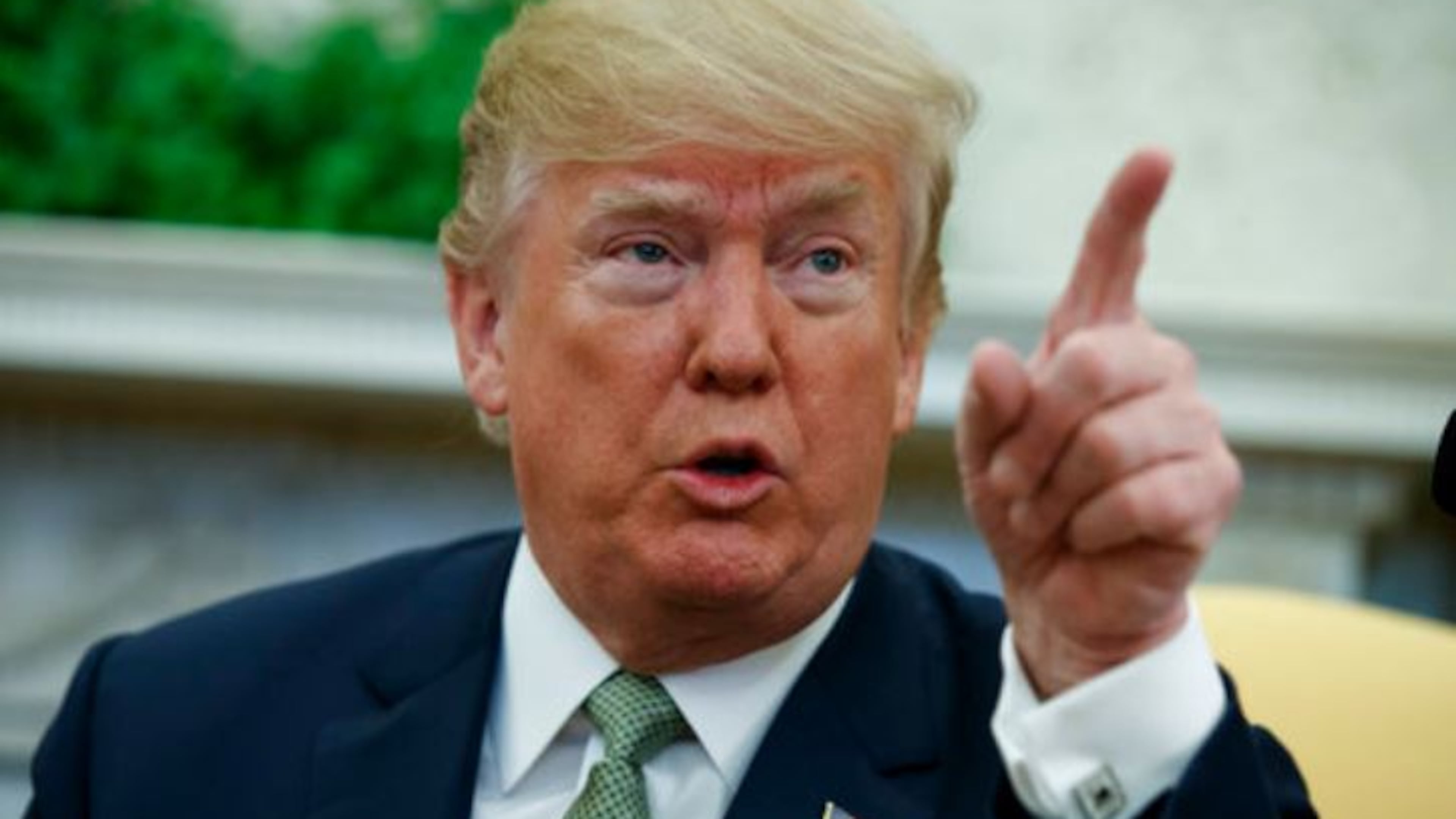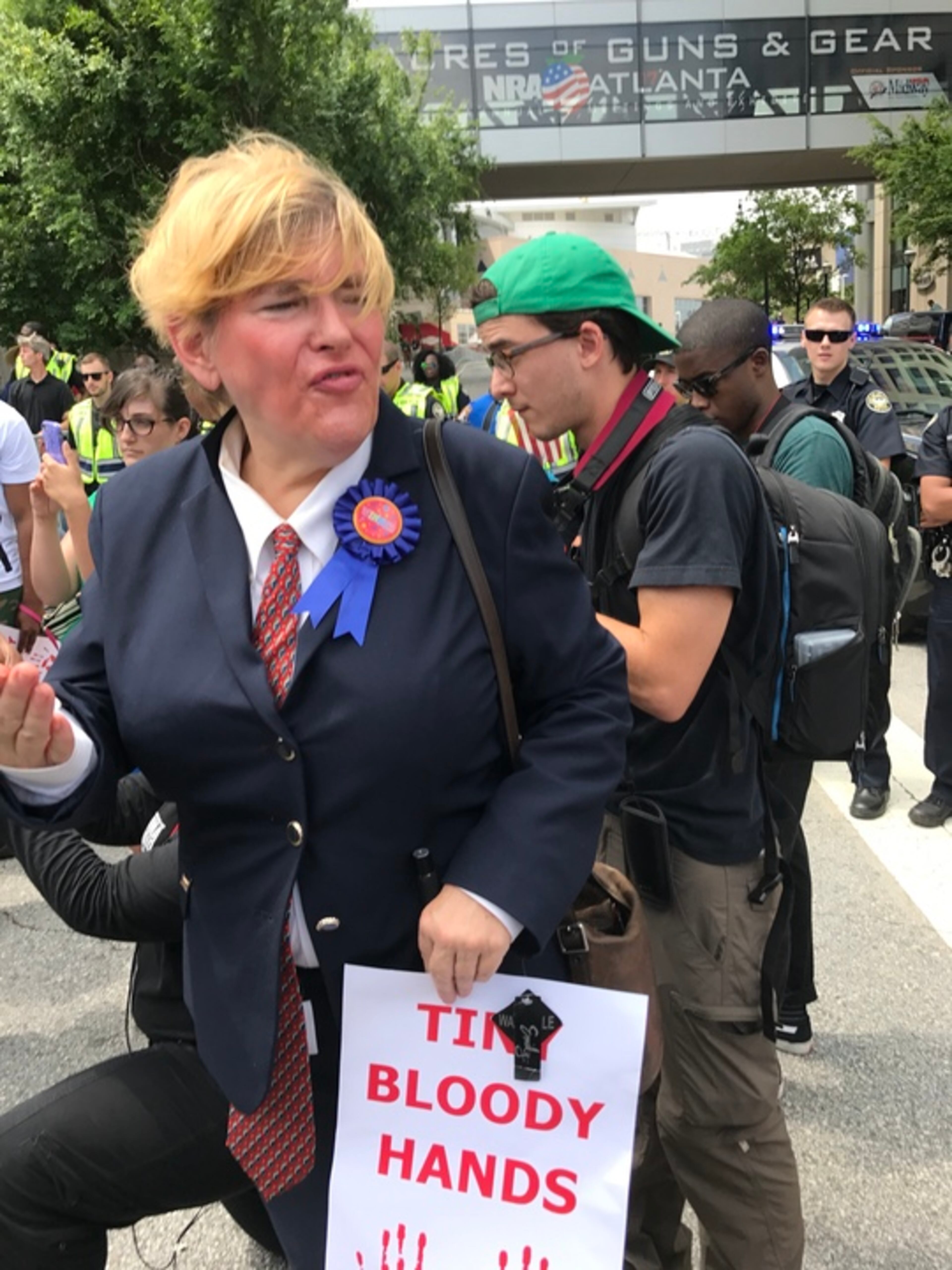Why Trump is dominating everything about Georgia’s elections

Brad Carver walked door to door along a tree-lined street in Sandy Springs, armed with flyers plastered with President Donald Trump’s face and a smartphone app identifying which of the residents inside the tidy ranch homes were most likely to vote Republican.
He had hardly arrived at one flag-festooned house when the owner walked outside to utter seven words to the GOP canvasser: “I’m Trump. And Republican down the line.”
The presidential race is dominating all facets of Georgia politics, and Trump’s race against Joe Biden has shaped the down-ticket races that will decide who controls a state once so solidly Republican that Trump and Hillary Clinton hardly bothered to campaign here in 2016.
In this cycle, Republicans are parroting Trump’s most scathing attack lines, accusing their Democratic opponents of plots to defund the police, blasting them as China-sympathizing socialists, casting them as radical extremists and tying them to unpopular programs such as the Green New Deal.
And Democrats who once used to skitter away from their party’s national figures have leaned into attacks on the president, casting blame on Trump for his handling of the coronavirus plague and social justice protests that have dominated this chaotic election year.

Unlike in past election cycles, when divisive primaries gave way to broader electoral appeals, top candidates aren’t scrambling toward the middle. Leading Democrats have endorsed raising taxes on the wealthiest and taking stances on social issues that years ago would have doomed their campaigns.
And after largely stamping out the “Never Trump” movement in Georgia, prominent Republican contenders aren’t moving an iota away from the president. Echoing the president’s reelection campaign, they’re warning of a descent into lawlessness in the suburbs if Biden wins and touting their pro-Trump voting records.
Chuck Clay, a former chair of the Georgia GOP, recounted how a top Republican official recently lamented that the nationalization of races in the state has eclipsed local issues as mundane as traffic congestion and zoning fights.
“Everything is now about Biden and Trump — even the county surveyor’s race. That’s how far down the pike this is going,” said Clay, who was once a state Senate GOP leader. “I get it. We’re in a time of great turmoil. And it’s hard to get a breath in if you’re not focused on the presidential race.”
‘Providential'
It starts at the top. While some Republican U.S. Senate candidates in other states are trying to keep the president at arm’s length, the opposite has happened in Georgia. That was on vivid display last week, when Trump held a rally in Middle Georgia to energize rural white conservatives.
It wouldn’t have been too surprising to see U.S. Sen. David Perdue, who is locked in a tight race with Democrat Jon Ossoff, try to put some distance between himself and Trump, whose approval ratings in Georgia give Democrats a shot at carrying the state for the first time in 28 years.

But unlike Republicans in other tight races, Perdue has leaned into his four-year record of loyal support for the president. He sent a ripple of applause through the crowd of thousands when he said Trump was sent by the heavens.
“This guy is providential. He didn’t happen by accident,” Perdue said. “How in the world in our political system could Donald J. Trump come on the scene in 2016 and do what he did? Tell me. God’s watching.”
The language has been even sharper in the GOP feud in the special election for Georgia’s other Senate race. U.S. Sen. Kelly Loeffler and U.S. Rep. Doug Collins have scrambled to define themselves as the “100% Trump supporter” and tie each other to China, a favorite bogeyman of the president.
That’s a far cry from the strategy in 2018, when vulnerable Georgia Republicans emphasized their own Washington voting records rather than tying themselves to Trump’s campaign. This cycle, even when local issues arise, they often have a Trumpian tint.
Former U.S. Rep. Karen Handel, one of Trump’s top allies in metro Atlanta, recently aired TV ads for her comeback bid warning that Democrats would take away “local zoning decisions” in a nod to Trump’s dire warning of fallout in the suburbs if he loses.
Republican state Rep. Bert Reeves needs no reminder of the presidential influence in down-ballot races — and not just because his Cobb County district has become increasingly competitive since Trump’s rise.

His Democratic opponent, Priscilla Smith, is known for dressing up as “Donna J. Trump,” complete with bright-orange makeup and a lengthy red tie, and visiting the Capitol to mock the commander-in-chief.
On the campaign trail, Reeves said he tries his best not to get “bogged down” in national politics, instead focusing on the sweeping overhaul of Georgia’s adoption code that he orchestrated and crackdowns on human trafficking. But candidates are finding it hard to drive local messages in such a divisive atmosphere.
“There’s no doubt the national elections are impacting the local elections, and it’s certainly the most frequent conversation I have when interacting with voters in the district,” he said.
“But once I talk to voters about issues I’ve worked on," Reeves said, "I am able to connect and move past the national issues.”
‘A standoff’
The polarization has intensified with the fade of split-ticket voting. Georgians last split the state ticket in top-level contests in 1998, when Democrat Roy Barnes and Republican Paul Coverdell won races for governor and the U.S. Senate, respectively. Republicans have steadily consolidated power since.
Now, split-ticket voting is largely viewed as a relic of the past. The 2016 presidential race saw the lowest level of mixed balloting in more than a century, according to political scientist Larry Sabato at the University of Virginia.
A Pew Research poll this week showed just 4% of registered voters in states with Senate contests said they’ll back Trump or Biden and then cross the ballot to vote for a Senate candidate from the opposing party.
And while Republican U.S. Sen. Johnny Isakson outperformed Trump in 2016 by about 4 percentage points against a little-known rival, many analysts doubt Perdue will outdo the president by even a quarter of that margin.
That’s also shaping the other side of the ticket. Not long ago, statewide Democratic candidates did their best to avoid nationalizing races. Michelle Nunn, Perdue’s Democratic challenger in 2014, saw fit to avoid a September meeting with then-President Barack Obama when he arrived to give an update on the Ebola crisis.
Now, with a surge of new voters on the rolls, Democrats are placing Trump at the center of their election-year attacks.
Ossoff has excoriated Perdue for “imitating” the president when he mocked the pronunciation of U.S. Sen. Kamala Harris' name. And Raphael Warnock, the Democratic front-runner in the race for Loeffler’s seat, asserts the “Senate needs a pastor” amid Trump’s presidency. Both joined Harris on Friday during her first trip to Georgia since she became the vice presidential nominee.
“There’s no question that the terrible handling of the COVID-19 pandemic and the economy has placed President Trump in a very vulnerable position that will impact races down ballot,” Warnock said. “But we’ve got a lot of great candidates that will impact the top.”
That message might make strategic sense for Democrats on a statewide level, with polls showing a deadlocked race. But it presents challenges for Democrats in more underdog roles.
Democrat Angela Mayfield is competing in a Republican-leaning state House district in west Georgia that Trump easily carried in 2016. The dynamics are closer now, but Trump still “leads every conversation” — even though she tries to never bring him up.
“I assume I’m not going to change anyone’s mind. I have zero ability to influence national politics — but I can change Georgia,” she said, before describing the uneasy tension in her district.
“I know which neighbors have Trump signs in their yards, and I still wave at them. And they still wave at me. There’s a polite disregard,” she said. “It can feel like a standoff and no one knows what will happen next.”



